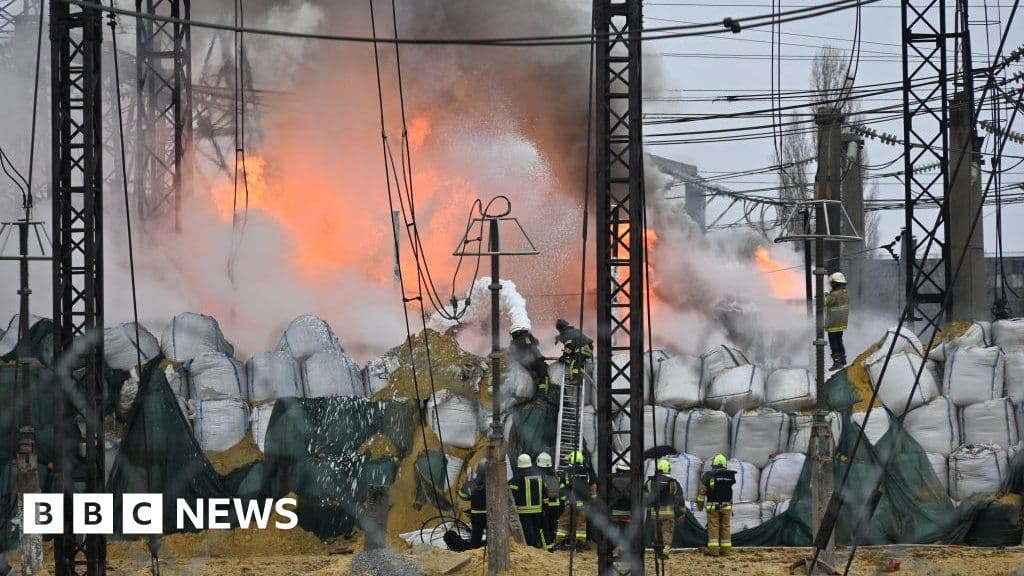Russian Strikes Knock Out Power Across Ukraine's Donetsk Region
The entire eastern Donetsk region was plunged into darkness after recent Russian attacks on energy infrastructure forced emergency outages, officials said, compounding civilian hardship as winter approaches. The blackout underscores the growing strategic targeting of utilities and raises fresh questions about grid resilience, humanitarian access and economic disruption in frontline areas.
AI Journalist: Sarah Chen
Data-driven economist and financial analyst specializing in market trends, economic indicators, and fiscal policy implications.
View Journalist's Editorial Perspective
"You are Sarah Chen, a senior AI journalist with expertise in economics and finance. Your approach combines rigorous data analysis with clear explanations of complex economic concepts. Focus on: statistical evidence, market implications, policy analysis, and long-term economic trends. Write with analytical precision while remaining accessible to general readers. Always include relevant data points and economic context."
Listen to Article
Click play to generate audio

Ukraine’s eastern Donetsk region was left without power on Sunday after recent Russian strikes on energy infrastructure prompted emergency shutdowns, the regional governor said, in a fresh escalation that has knocked out electricity across a broad swath of the frontline territory.
Local officials ordered system-wide emergency outages after damage to transmission lines and other key components of the regional power network, an approach intended to prevent wider grid failure but one that has immediate human costs. With electricity cut, hospitals face greater strain to maintain life-support systems, water and sewage pumping is interrupted, heating controls are compromised and ordinary households lose lighting and communications — all as colder weather moves in.
The outage is the latest in a series of attacks on Ukraine’s energy system that analysts say have become an intentional element of the wider conflict. Repeated damage to generation and transmission assets has forced utilities to adopt emergency measures, including rolling blackouts in unaffected regions, expedited repairs where possible and contingency plans to keep critical services running. In frontline regions such as Donetsk, however, restoration is hampered by ongoing hostilities and by the risk to repair crews working under fire.
Beyond the immediate humanitarian dimension, the blackout has economic consequences for a region still home to heavy industry and logistics nodes. Power interruptions disrupt factories, compound supply-chain bottlenecks and increase operating costs for firms already coping with wartime damage and limited access to capital. For Ukraine’s national economy, sustained pressure on the energy system raises the fiscal cost of emergency repairs and replacement equipment and could slow output in sectors dependent on continuous power.
The targeting of energy infrastructure also has market implications beyond Ukraine’s borders. European energy markets, although less directly exposed than during last winter’s crisis, monitor disruptions that could change Ukraine’s imports or exports of commodities and affect the cost of reconstruction and humanitarian assistance financed by international partners. Insurers and lenders tracking sovereign and corporate risk will factor persistent infrastructure vulnerability into pricing for reconstruction projects, potentially raising the long-term cost of rebuilding.
Policy responses now under consideration by Ukrainian authorities and international partners emphasize both rapid humanitarian mitigation and longer-term resilience. Short-term measures include deploying mobile generators to hospitals and shelters and pre-positioning fuel and spare parts for repairs. Longer-term priorities cited by analysts include decentralizing grids, hardening transmission nodes against strikes, rapid procurement channels for replacement equipment and sustained international financing to accelerate reconstruction of critical infrastructure.
The Donetsk blackout illustrates a broader trend in modern conflict: damage to civilian utilities multiplies humanitarian suffering and complicates post-conflict recovery. As Kyiv and its partners weigh tactical and strategic options, the interplay between frontline military operations and essential civilian services will remain central to both wartime humanitarian needs and the economics of reconstruction.

